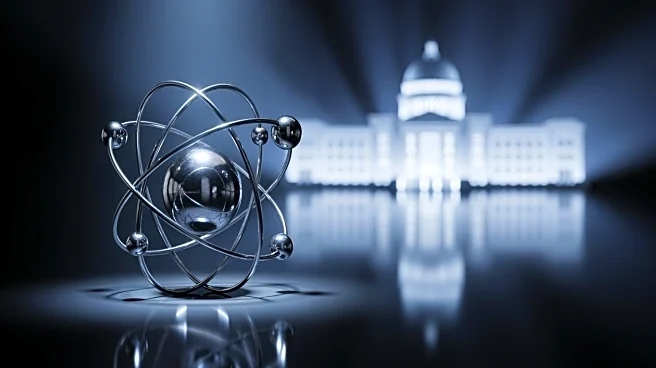What's Happening?
Top officials from the Department of Energy and the National Nuclear Security Administration (NNSA) are set to meet with the White House to discuss President Trump's recent suggestion to resume nuclear
weapons testing. Energy Secretary Chris Wright and NNSA leader Brandon M. Williams, along with officials from the US National Laboratories, aim to dissuade the President from pursuing explosive nuclear warhead testing. This meeting follows Trump's social media post instructing the Department of Defense to start testing nuclear weapons due to other countries' testing programs. The NNSA, responsible for building and testing bombs, plans to inform the White House that explosive testing is not feasible. The last full-scale nuclear weapons test in the US occurred in 1992, and the practice was banned by former President Bill Clinton in 1996.
Why It's Important?
The potential resumption of nuclear testing by the US could have significant geopolitical implications. It may provoke other nations, such as China and Russia, to conduct their own tests, escalating global tensions. Additionally, nuclear testing poses environmental and health risks, particularly to communities near testing sites. The US has historically relied on data from Cold War-era tests, and experts argue that there is no current need for explosive testing. The decision to resume testing could also face legal challenges from environmental groups, potentially delaying or halting the process. The meeting between energy officials and the White House is crucial in steering the administration towards a non-explosive testing approach.
What's Next?
If President Trump decides to proceed with nuclear testing, it would likely occur at the Nevada Test Site, the only underground site designed for such tests. However, this would require approval from the state government, which may resist due to the legacy of nuclear waste and health impacts from past testing. The NNSA has prepared a memo outlining the timeline for resuming testing, estimating it would take at least 36 months to obtain scientifically useful data. The administration may face lawsuits from environmental groups, further complicating the process. The meeting aims to align the President with NNSA's approach, avoiding explosive testing while maintaining national security.
Beyond the Headlines
Resuming nuclear testing could have long-term implications for US foreign policy and international relations. It may undermine global non-proliferation efforts and lead to increased nuclear arms development worldwide. The ethical considerations of testing, including the impact on human health and the environment, are significant. The decision could also affect the US's standing in international agreements and its ability to negotiate on nuclear issues. The meeting between energy officials and the White House is a critical step in addressing these broader concerns.









